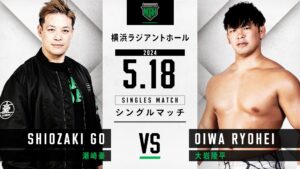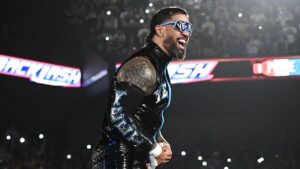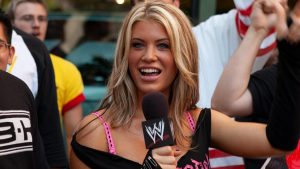This week’s episode of SmackDown will be a little bit different to what we are used to. The Friday night broadcast will be a celebration of Triple H‘s pro-wrestling career. Specifically, it will be a celebration of Triple H’s WWE career – though you can find the pre-WWE portion of his career here. On April 30th, 2020, Triple H will have spent an entire quarter-century in the WWE. That’s right; twenty-five years. What a career he has had! Since arrogantly strutting and curtsying onto our screens on April 30th 1995, Hunter Hearst Helmsley has become one of the most important wrestling figures in pro-wrestling history. Therefore, pour yourself some of the finest French champagne, sit back and join us as we take a look back through the WWE career of pro-wrestling’s “Cerebral Assassin” (and “The Game”, and the “Connecticut Blueblood” etc).
Triple H: The Connecticut Blueblood
Paul Levesque – real name of Triple H – joined what was then the WWF in January of 1995. The move from WCW to the WWF came after Vince McMahon saw who was then Jean-Paul Levesque perform in person at Starrcade 1994. If only both men knew at the time how interlinked their futures would become. His debut would then, of course, come at WWF’s Wrestling Challenge on April 30th, 1995. Entering the World Wrestling Federation‘s world as a member of the Connecticut nobility, Hunter Hearst Helmsley would enjoy a successful debut against Buck Zumhoff. Jim Ross, on commentary for the match, put it best at the bout’s conclusion:
“…We’re going to be seeing more of hunter hearst helmsley…” – jim ross
Whether Good Ol’ JR knew at the moment that he was witnessing the debut of the potential heir to the company is unknown. However, Hunter Hearst Helmsley did enjoy a successful debut. Triple H does not always get the credit he deserves for his portrayal of that character. Indeed, his facial expression; general posture and smug manner of working his matches demonstrate just how great a worker Triple H was – even then. Shortly after victories over Bob Holly at SummerSlam 1995 and Henry O. Godwinn at In Your House 5: Seasons Beatings, Hunter’s career took a downward turn.
WrestleMania XII and The Kliq
WrestleMania XII should have been the first big WrestleMania in the storied career of The Game. Instead, when fans Google the outcome of Triple H’s first WrestleMania, they scratch their heads. At WrestleMania XII, Triple H was defeated by The Ultimate Warrior in just over two-minutes. In the match, Warrior infamously no-sold The Pedigree – getting up immediately after impact, unscathed. Of course, there is more to the story than a traditional burial. Triple H had become a member of backstage faction “The Kliq” since his debut. Alongside Shawn Michaels, Scott Hall, Kevin Nash and Sean Waltman, they would together form the group believed by many to be an influencing factor in Vince McMahon’s booking process. After the infamous Curtain Call incident in April 1995 – where the group would break kayfabe at Madison Square Garden, embracing in a final goodbye to the departing Hall and Nash – punishment was to be dealt. With Nash and Hall departing, X-Pac in rehab and Shawn Michaels sitting untouchable as WWF Champion, Triple H was to be punished.

Triple H would accept his punishment without protest. His agreeing to punishment – enduring months of enhancement matches, alongside the Warrior squash match – would win the respect of anti-Kliq members of the locker room, such as The Undertaker. In something for the all-time alternative wrestling history discussions, Triple H’s scheduled King of the Ring 1996 victory was delayed a year. King of the Ring 1996 would instead be won by a man called “Stone Cold” Steve Austin. His victory would, of course, result in the famous “Austin 3:16” promo, seen by many as the official beginning of the Attitude Era. 1996 would not be a complete write-off for Hunter. He would win his first Intercontinental Championship from Marc Mero in October of that year. Though Hunter’s three initials – HHH – are the most important of his career, there are another two which draw significance: D-X.
Triple H: D-Generation X
Shortly after his Intercontinental Championship win, Triple H would hook-up with Chyna. Chyna – Triple H’s on-screen bodyguard – would accompany him during his victory at King of the Ring 1997. This came after his belated WrestleMania victory against Goldust at WrestleMania XIII. His career was back on track and whereas he may have felt that Austin’s spot post-KOTR 1996 was his, 1997 was better late than never. Shortly after, Triple H would form D-Generation X with Chyna, Rick Rude and fellow Kliq comrade, Shawn Michaels. The formerly conservative Helmsley character was abandoned; trading in his curtsy for crotch chops. Comments on opponents being beneath him were replaced by chants of “suck it!” This was a very new direction for Hunter and it was now clear that the Attitude Era was in full force. It was around this time where the mouthful “Hunter Hearst Helmsley” name was simplified to the more marketable “Triple-H”.
Feuds with the Hart Foundation – culminating in a Triple H victory over Owen Hart at WrestleMania XIV – among others would follow. Of course, Triple H would come to feud with arguably his greatest rivals in Mankind, Steve Austin, Undertaker and The Rock. This era was an era where some of the biggest stars in pro-wrestling history were all under the same building, night-after-night. It just so happens that Triple H was one of these stars and alongside his D-X comrades, was able to go to war with them all over the world. For this reason, among many others impossible to compress into an article, D-X remains one of the greatest factions of all-time. Triple H’s time in the group came to an end (at least for now) at WrestleMania XV. After Chyna cost Triple H a victory against Kane, he betrayed X-Pac and aligned with The Corporation.
Triple H: Game On

After aligning with The Corporation, Triple H abandoned much of his D-X persona. He changed his appearance; opting for denim jackets, wet hair and water bottles (which he had sometimes used in D-X). Instead of the goofy innuendos deployed in his D-X days, he took on a more serious character. This was the beginning of The Game: a more serious take on the Triple H persona who just wanted to beat people up. He did just that; winning his first WWF Championship from Mankind one night removed from SummerSlam 1999 on an episode of RAW is War. This would, of course, be the first of many. He would win his second at No Mercy 1999, after having dropped the title to Mr. McMahon earlier in the year. This was the feud where Triple H attempted to derail Mr. McMahon by marrying his sedated daughter at a drive-thru Vegas themed wedding. Of course, as we all know, Stephanie McMahon and Triple H married in real life around this time. So began the McMahon-Helmsley era.
Triple H would capture his third WWF Championship from Big Show on the January 3 episode of RAW is War, 2000. He successfully defended it against The Rock at WrestleMania XVI. The Game would carry on in the same vein throughout much of 2000 – remaining in the title picture. By the time of WrestleMania XVII, Triple H was feuding with The Undertaker who would, of course, defeat The Game in a solid bout. The following night, Triple H would join up with long-time foe, Steve Austin – who Triple H infamously paid Rikishi to run over – and brutally dismantle The Rock. This was to write The Rock out of storylines whilst he filmed The Scorpion King. A third Intercontinental title, accompanied simultaneously by a run as WWF Tag Team Champion with Stone Cold would follow. Shortly after, on the May 21 2001 edition of RAW is War, Triple H would suffer a torn quadriceps muscle. His first major injury in the WWF, this would end the Two Man Power Trip; write him out of storylines and cause The Game to miss the entirety of the Invasion Era.
The Return and “Reign of Terror”
Triple H would return on January 7, 2002 to an enormously welcoming reception. Triple H himself was shocked by this, as he was a top heel prior to his injury. He would go on to win Royal Rumble 2002 and defeat Chris Jericho for the Undisputed WWF Championship at WrestleMania XVIII. The match itself suffered from an exhausted crowd, who were worn out by the previous Hulk Hogan versus The Rock match. However, there was no denying The Game was back. A month later, Triple H would drop the championship to Hulk Hogan. Later that year, Triple H moved to the RAW brand – aligning with a returning Shawn Michaels, who had missed the past four and a half years with a serious back injury. Of course, in true Triple H fashion, he turned on HBK – igniting a feud which would see out 2002. Memorable feuds with Kane (for the wrong reasons) and Rob Van Dam would also see out 2002. Additionally, during this time, Triple H was awarded the World Heavyweight Championship – becoming its inaugural holder.

The 2002 – 2004 period of Triple H’s career is often referred to as the “Reign of Terror”. The reason for this is simple: Triple H beat everybody. At WrestleMania XIX, for example, Triple H defeated Booker T after a racially charged feud which insinuated African Americans can’t win the championship. He defeated Scott Steiner. He defeated Goldberg, though this victory came after two defeats to Goldberg – with Triple H losing and regaining his championship in the feud. It was during this time Triple H began relying on the help of Evolution.

Evolution was a group consisting of Triple H, Ric Flair, Randy Orton and Batista. Ric Flair was the past; Triple H was the present and the talented duo of Randy Orton and Batista were to be the future. That is what the Triple H character wanted us to believe, of course. In truth, Triple H was using them to hold back Orton and Batista; using them in his repeated quests for the World Heavyweight Championship (which he lost at WrestleMania XX to Chris Benoit). He would recapture the title in an Elimination Chamber match at New Year’s Revolution 2004, after having turned on Randy Orton (who he faced with Team Triple H vs Team Randy Orton at Survivor Series 2004) months earlier over jealousy caused by Orton’s WWE title victory. He would successfully defend against Randy Orton at Royal Rumble 2005 – the same night Evolution stablemate, Batista, won the Rumble match. Sensing Triple H was about to turn on him, Batista acted first; turning face and defeated Tripled H at WrestleMania XXI.
Seeing Out the 2000s
Following his final defeat to Batista and Vengeance 2005, Triple H took a four-month hiatus from the ring. Much of the rest of the 2000s were spent feuding for the WWE Championship against the likes of Umaga, Jeff Hardy and King Booker. Despite winning the WWE Championship numerous times during this period, he spent more time putting opponents over as he began the early phase of transitioning to the executive, behind the scenes stage of his career. A D-X reunion in 2006 would mark the end of the Shawn Michaels feud; with the duo being on-screen friends ever-since.
Triple H had taken on the role previously occupied by Ric Flair in Evolution: Triple H was now the veteran. The older ring general on the roster, still hungry for glory against the young guns. More and more, the commentary team would refer to Triple H’s real life role as an executive within the company. When the 2000s finally came to a close, they went all in with Triple H’s transition to corporate executive. By 2011, The Game was now officially WWE’s Chief Operation Officer on-screen.
The 2010s and Winding Down
Many seem to hold the notion that Triple H truly finished his wrestling career in the 2000s. This is true to an extent, as he did transition to a behind-the-scenes role towards the end. However, he still had a number of memorable feuds during the 2010s. Of course, there was the CM Punk rivalry – featuring the questionable victory over the “Voice of the Voiceless” at the peak of the “Summer of Punk”. There was the duo of WrestleMania matches (XXVII and XVIII respectably) against The Undertaker: featuring two losses for The Game. Then there was the WrestleMania XXIX victory over Brock Lesnar. There was the monumental feud with Daniel Bryan where Triple H – as the head of The Authority stable – terrorized Bryan for almost a year. Of course, this culminated in Bryan’s now legendary victory in the main event at WrestleMania XXX. He even won the WWE Championship in the Royal Rumble 2016 match – his first (and last) world title in seven years.
Though not limited to WrestleMania appearances only, it is these matches and feuds which define Triple H’s in-ring career throughout the 2010s. At WrestleMania XXXIII, Triple H put over former Authority protegee, Seth Rollins. WrestleMania XXXIV saw Triple H team with wife, Stephanie McMahon, and put over Kurt Angle and the debuting Ronda Rousey. Finally, at WrestleMania XXXV, it would be Batista repaying his old friend by putting him over – fourteen years after Triple H did the same. Since this final victory over Batista, Triple H has wrestled just three times: once at WWE Super Showdown 2019, where he lost to Randy Orton. The other two matches came during house shows in Japan – where he teamed with Shinsuke Nakamura and The Club (AJ Styles, Gallows & Anderson) respectively. Whether or not The Game has one more big match in him remains to be seen. If not, what a career he has had.
Triple H: NXT Kingpin

Lastly, it is vital that this aspect of Triple H’s career is mentioned. Since 2012, Triple H has been the kingpin behind WWE NXT. Prior to Triple H’s TakeOver of NXT in 2012, the black and yellow brand was a sort of WWE themed reality TV show. With Triple H assuming the role of creator and senior producer of NXT, the show would go on to become one of the absolute highlights of pro-wrestling’s weekly output. For eight years now, NXT has been an absolute pleasure to watch; giving us a number of top quality, five star matches. The likes of Adam Cole, Johnny Gargano, Tommaso Ciampa, Finn Balor, Aleister Black, Kevin Owens, Sami Zayn and more have honed their craft in NXT and have become future WWE Hall of Famers as a result.
So there we have it. A twenty-five year, certified Hall of Fame worthy career. The Game has done everything there is to do – and more – in pro-wrestling. A fourteen-time World Champion; a five-time Intercontinental Champion; a corporate executive; founder of NXT as we know it and the potential heir to the entire World Wrestling Entertainment machine. What a career. A polarizing figure hated for much of the reign of terror, but adored for his role in NXT. Legendary for his wrestling career and equally so for his behind-the-scenes role. Whatever you think about Triple H, there is no denying his place in wrestling history. Happy twenty-fifth anniversary, Triple H!
Stay tuned to the Last Word on Pro Wrestling for more on this and other stories from around the world of wrestling, as they develop. You can always count on LWOPW to be on top of the major news in the wrestling world, as well as to provide you with analysis, previews, videos, interviews, and editorials on the wrestling world. WWE fan? You can check out an almost unlimited array of WWE and NXT content on the WWE Network.






